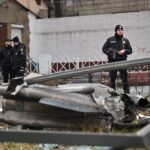
There was a surreal scene at the United Nations late Wednesday. While the Security Council was meeting, at Ukraine’s request, to discuss ways to avert a Russian invasion of Ukraine, Russian President Vladimir Putin launched his invasion. Russia’s U.N. ambassador Sergiy Kyslytsya, who holds the rotating chairmanship of the Security Council, insisted Russia hadn’t declared war, but rather “a special military operation in Donbas,” the eastern Ukrainian separatist enclave.
It was already clear by that point that Putin had ordered an attack on the entire country.
NBC News’ Sahil Kapur noted the immediate problem of Russia holding veto power with its permanent seat on the Security Council.
Ukrainian Ambassador Sergiy Kyslytsya suggested a sort of solution, apparently “laying the groundwork to challenge whether the Russian Federation is the legitimate successor to the USSR’s seat and veto on the Security Council,” MSNBC’s Hayes Brown tweeted. After the Soviet Union broke up in 1991, “the Russian Federation just ascended to that seat” with no modification to the U.N. Charter, he noted.
And here’s his demand for the documents that show that the Russian Federation was welcomed to the body by the UNSC and General Assembly. Those documents don’t exist as he noted because the UN legal counsel made the call pic.twitter.com/lKlZFs1rd0
— Hayes Brown (@HayesBrown) February 24, 2022
This isn’t a new fight for Kyslytsya, though he noted in a recent interview that Ukraine, like everyone else, long ignored Russia’s violations of the charter, due largely to Russia’s nuclear stockpile and military strength, the Kyiv Post notes. Kyslytsya now argues the Russian Federation must formally apply for membership, like other countries that have changed their names and structures.
According to Kyslystra, the Kyiv Post reports, “a vote must take place in each of three institutions supporting Russia’s seat in the Security Council: the Security Council, the General Assembly, and U.N. member states’ parliaments. At least 129 out of the current 193 U.N. member states must cast a vote in favor of its membership.”
Hayes pointed to the other example of a country getting a permanent Security Council seat outside the usual method: the People’s Republic of China, which took over the seat held by the Republic of China (Taiwan) after a 10-year standoff with the United Sates. And that took a vote in the U.N. General Assembly. “From 1961 – 1971, the U.S. made sure the question of the China seat at the UNGA was an ‘important question’ that required a two-thirds vote,” he notes. Russia, if challenged, could try for a similar vote, but it’s not clear it would, at this current moment, have the votes.
You may also like
Live stream of planes landing at Heathrow Airport during storm draws surprisingly big online crowd
Tensions between the U.S. and Russia just took their darkest turn yet
Watch a Clydesdale recover from injuries in Budweiser’s new Super Bowl ad




